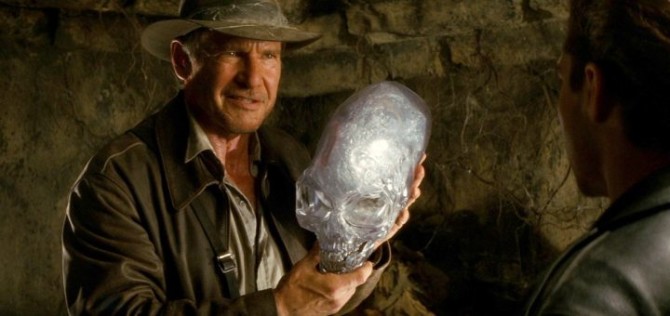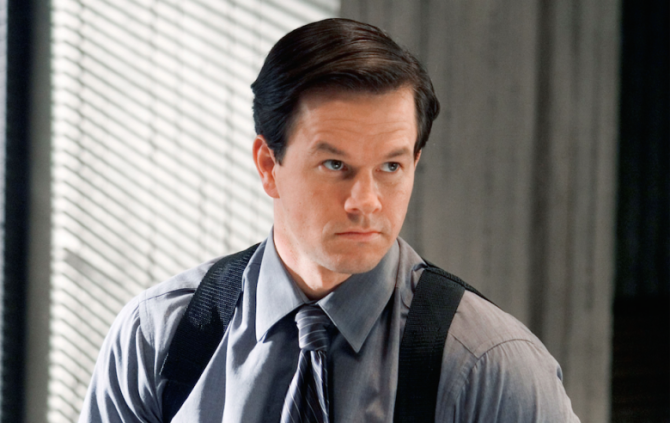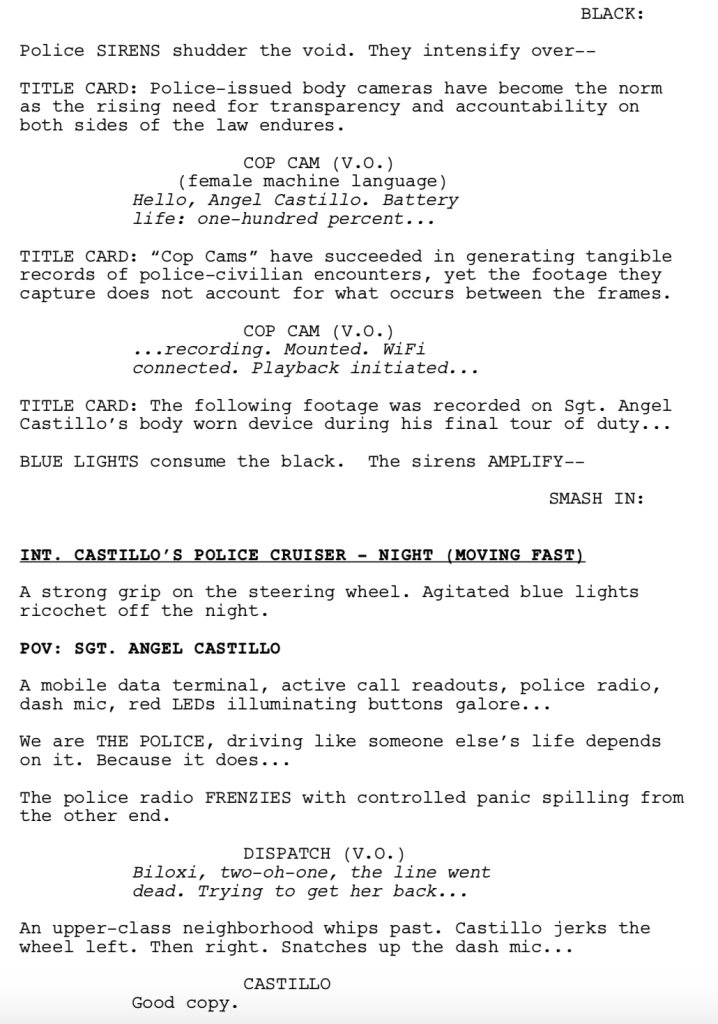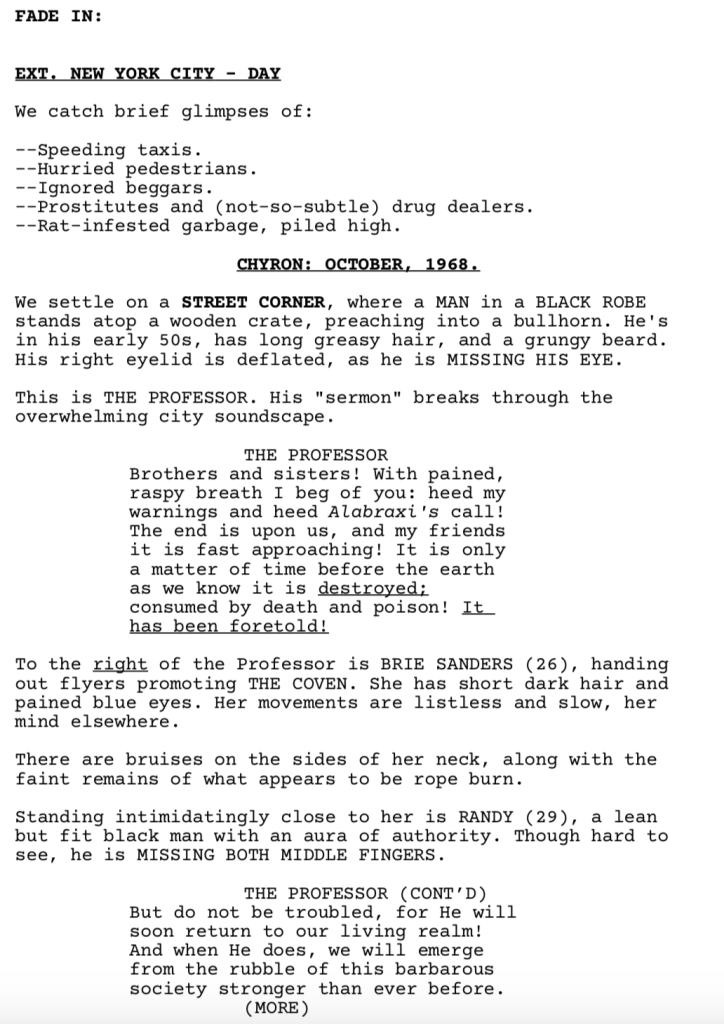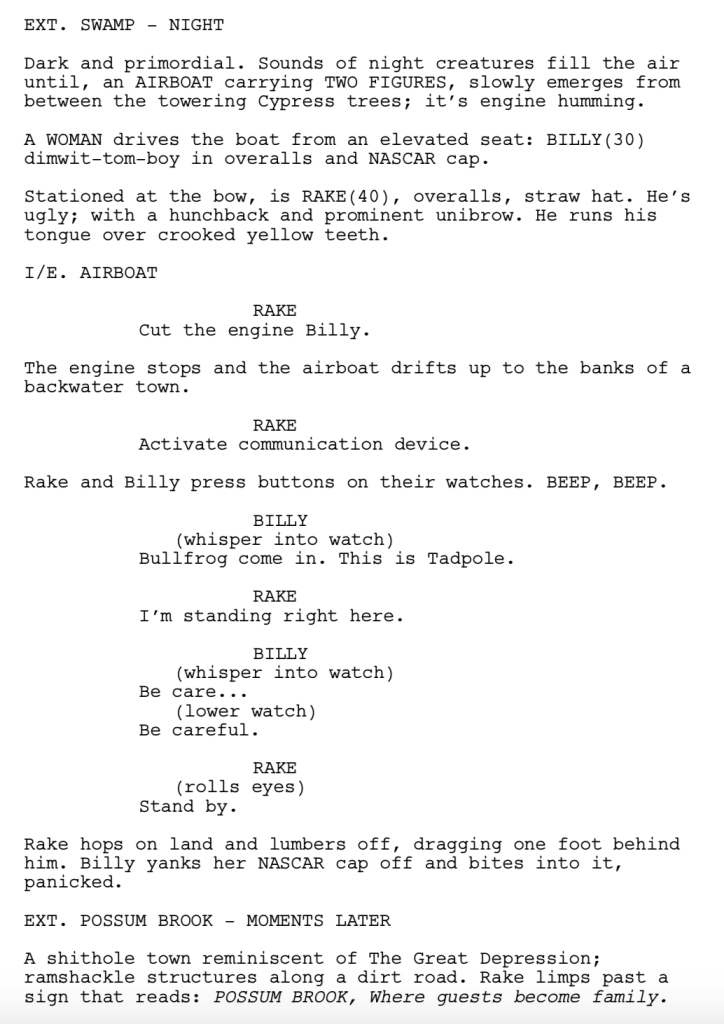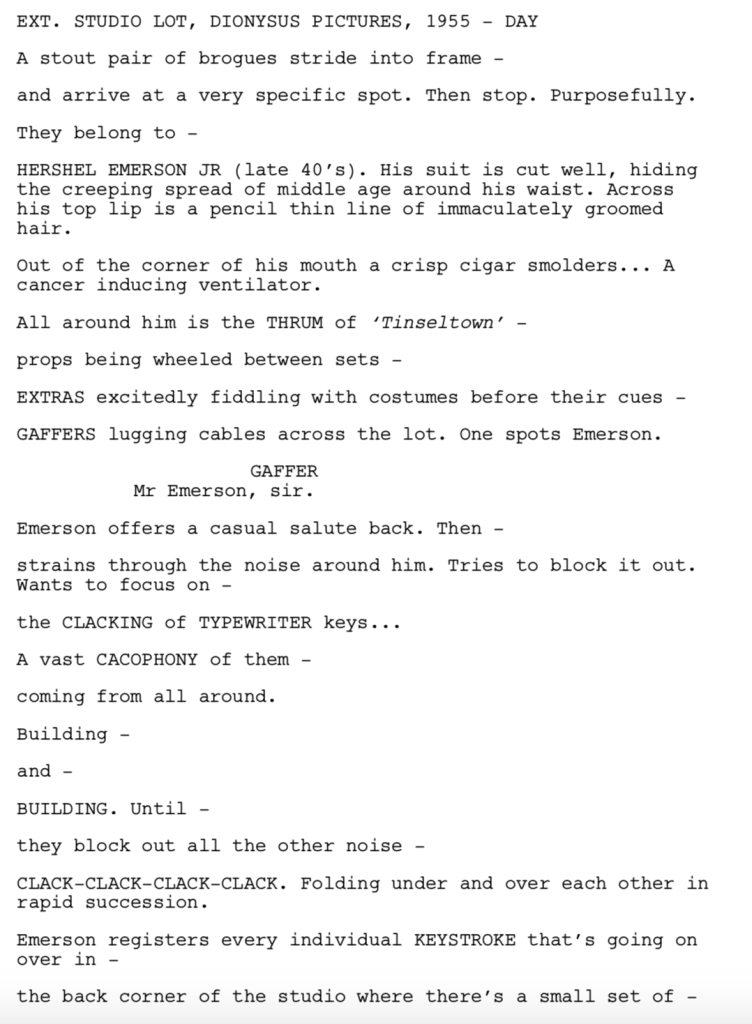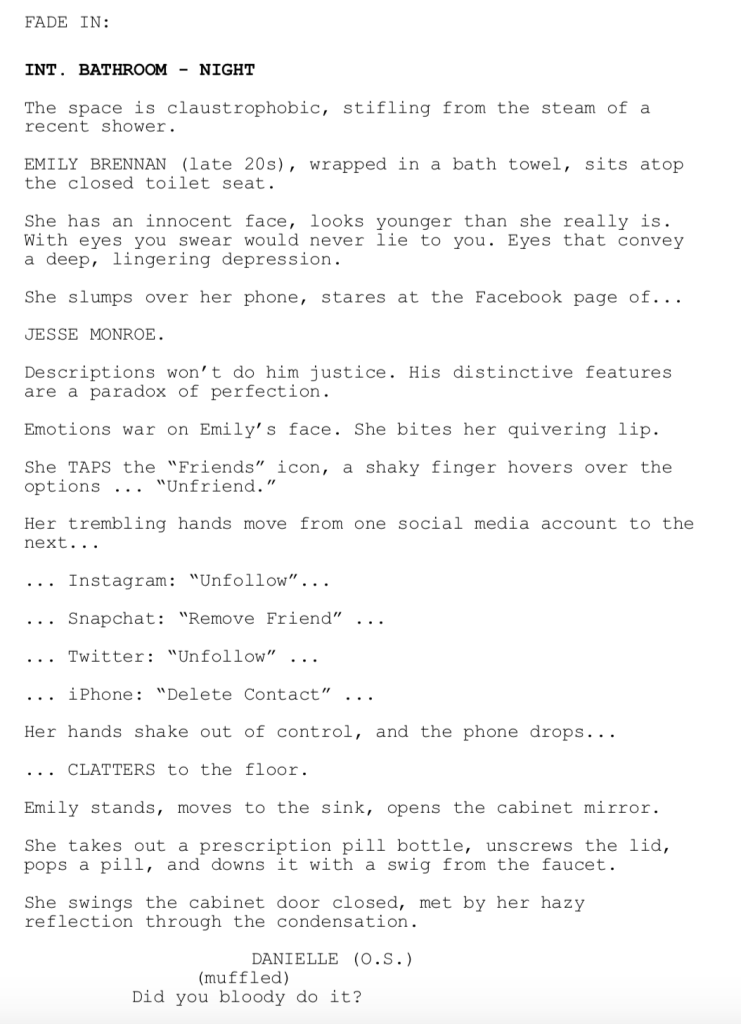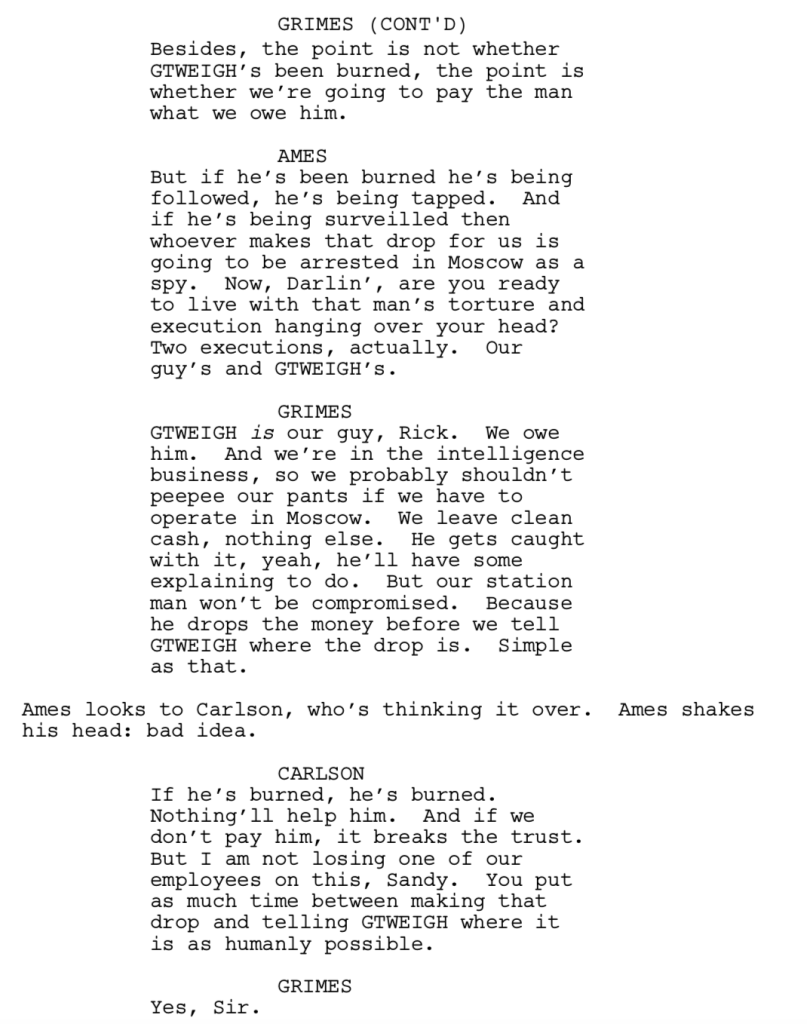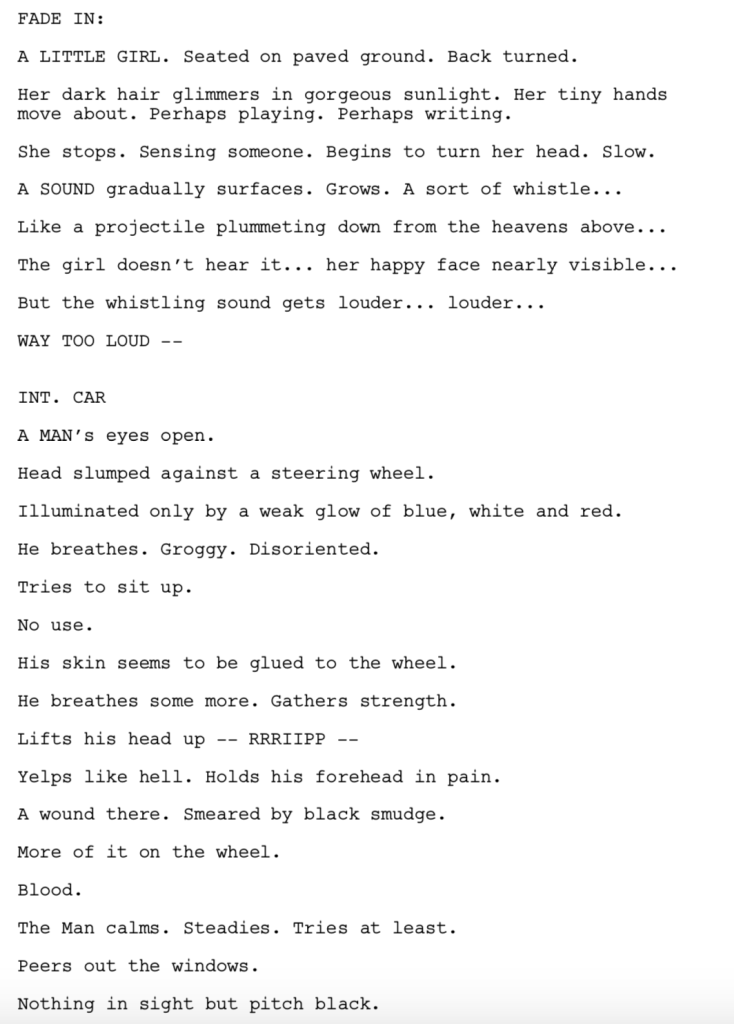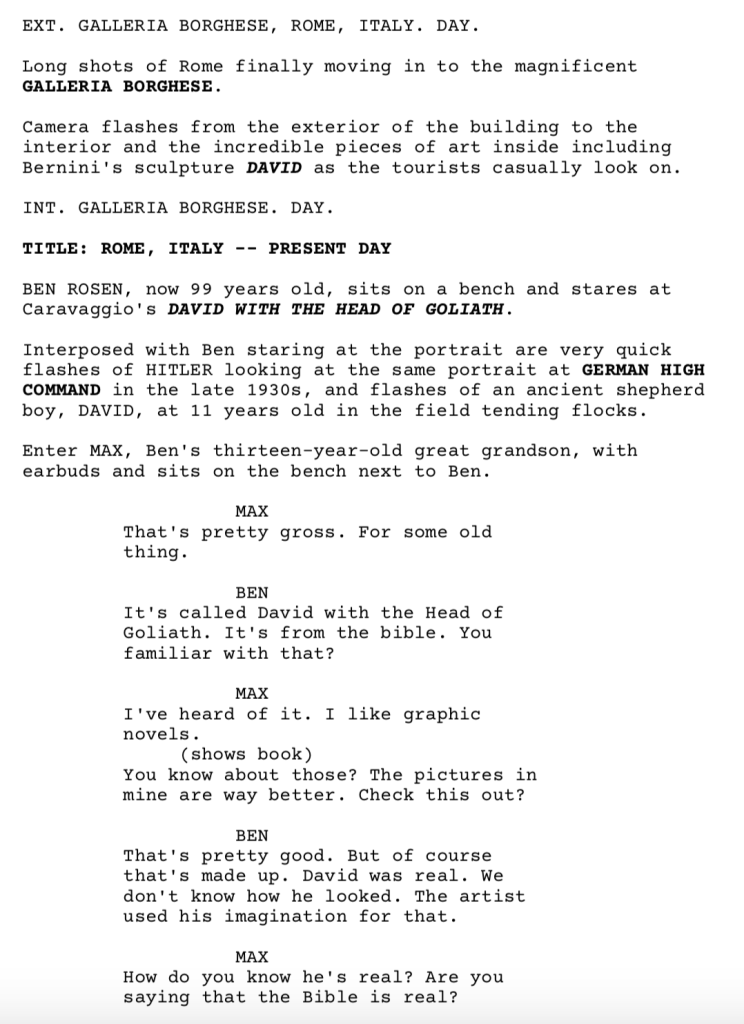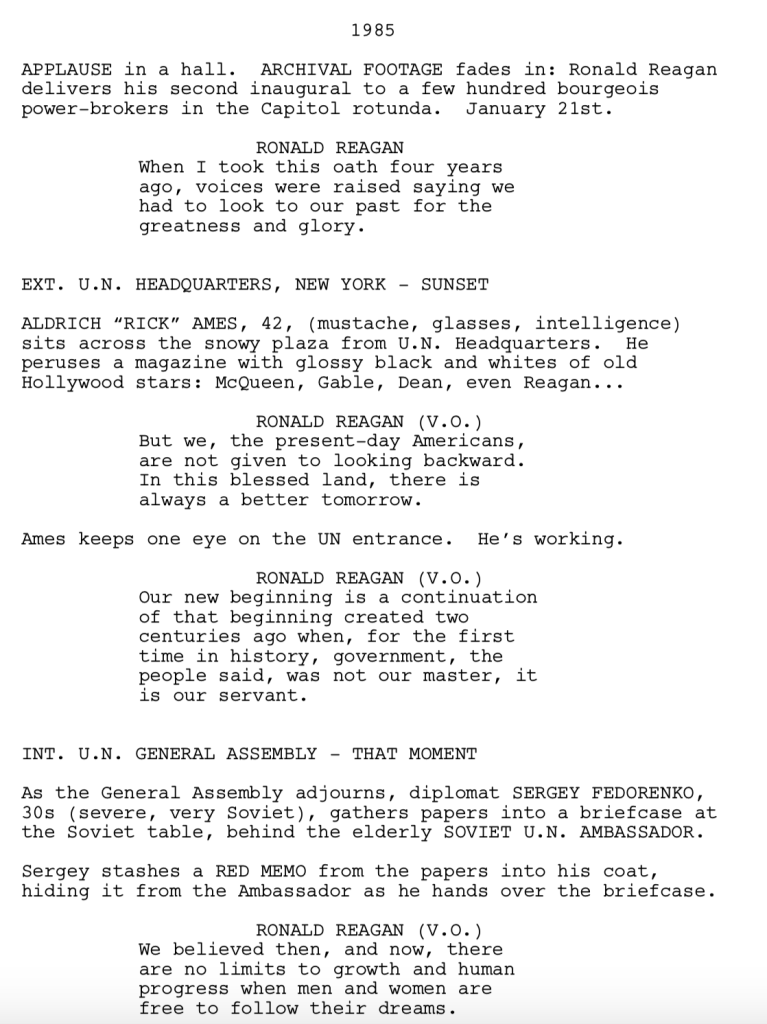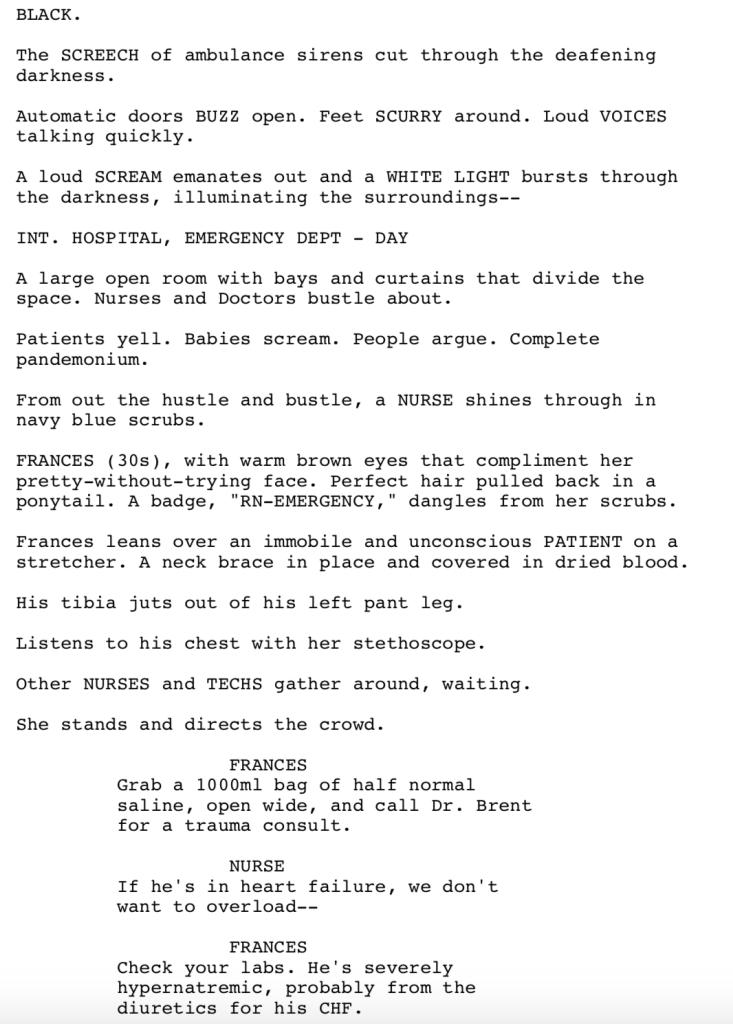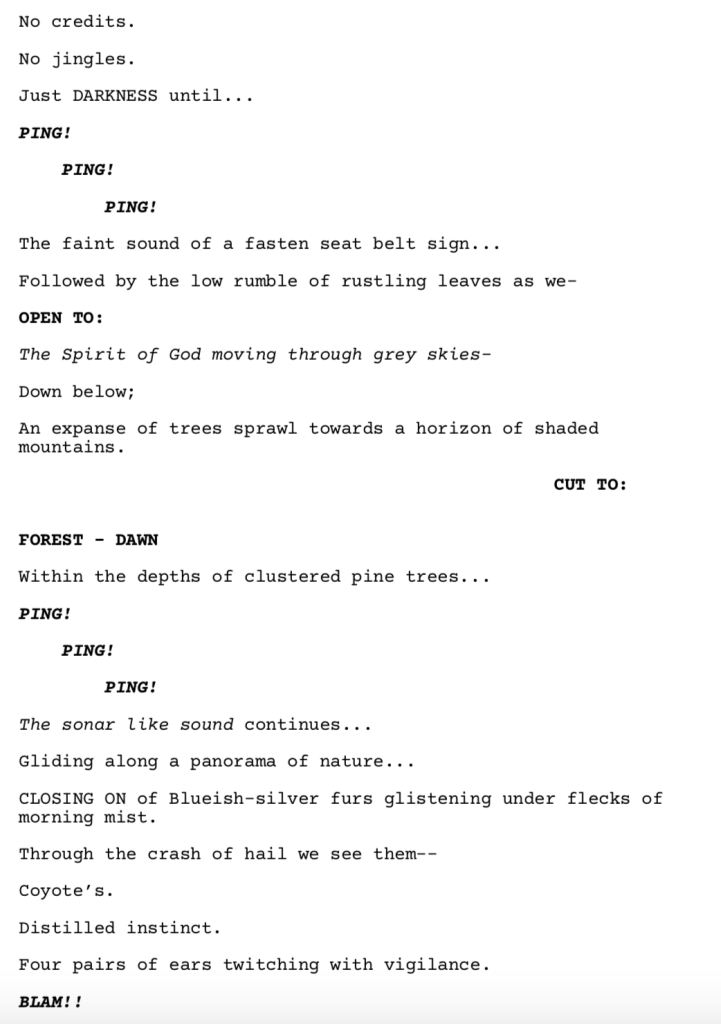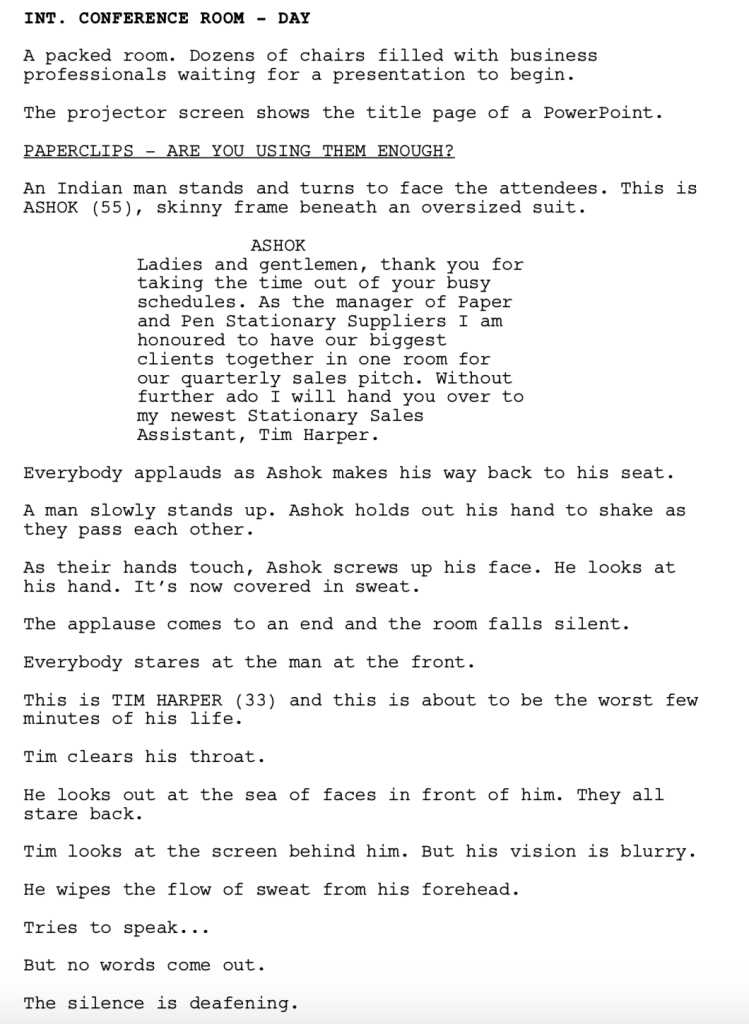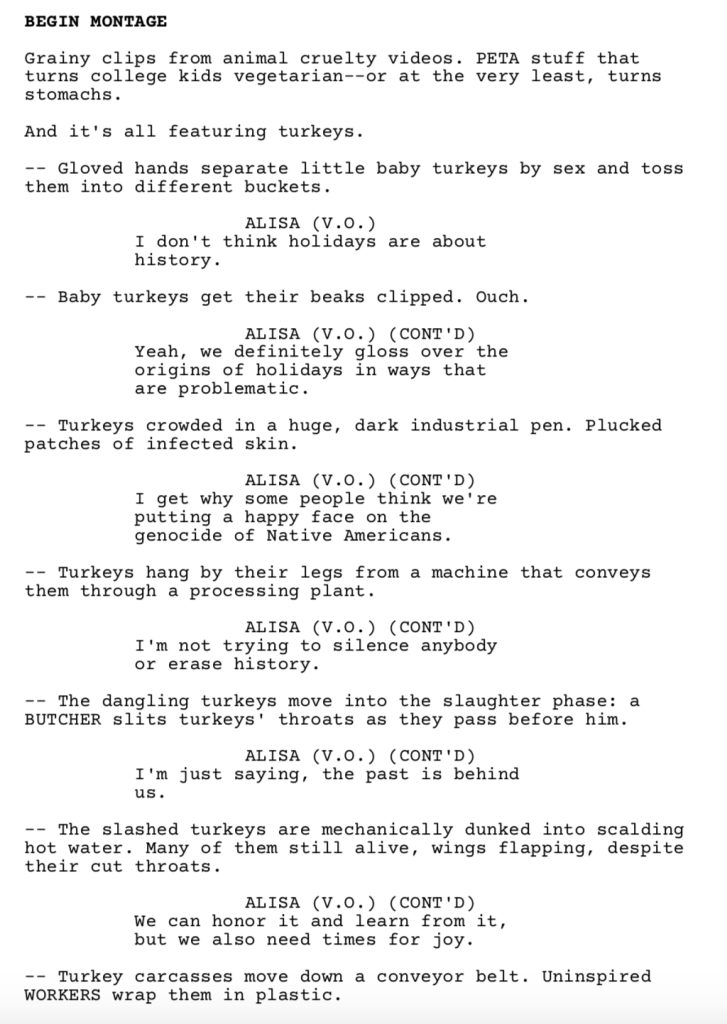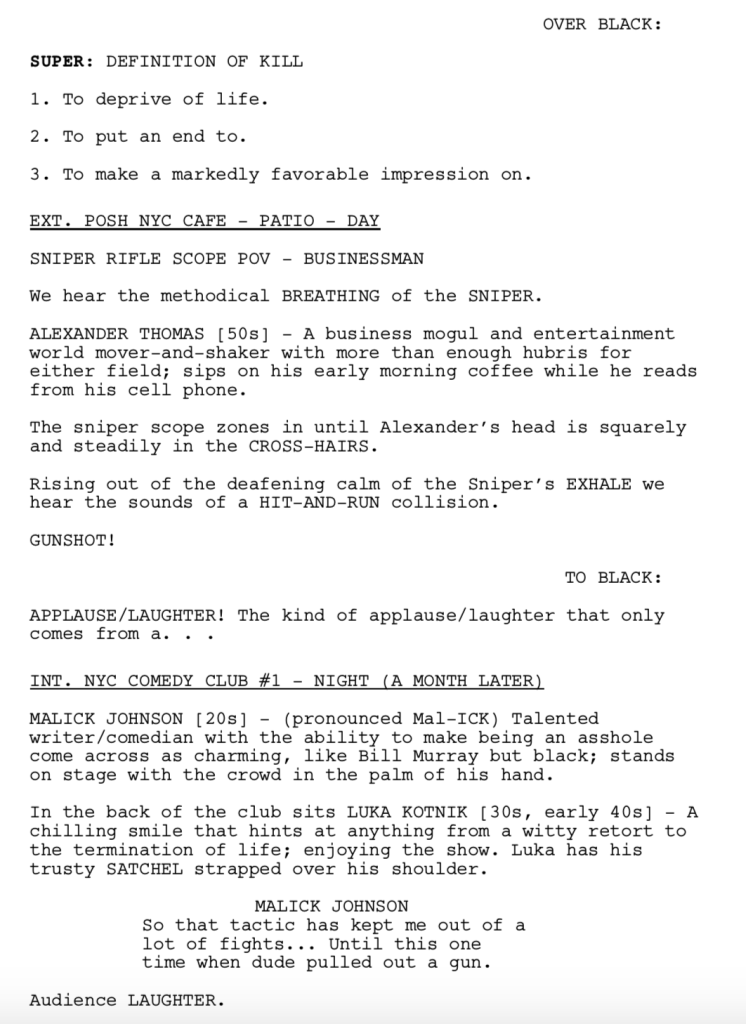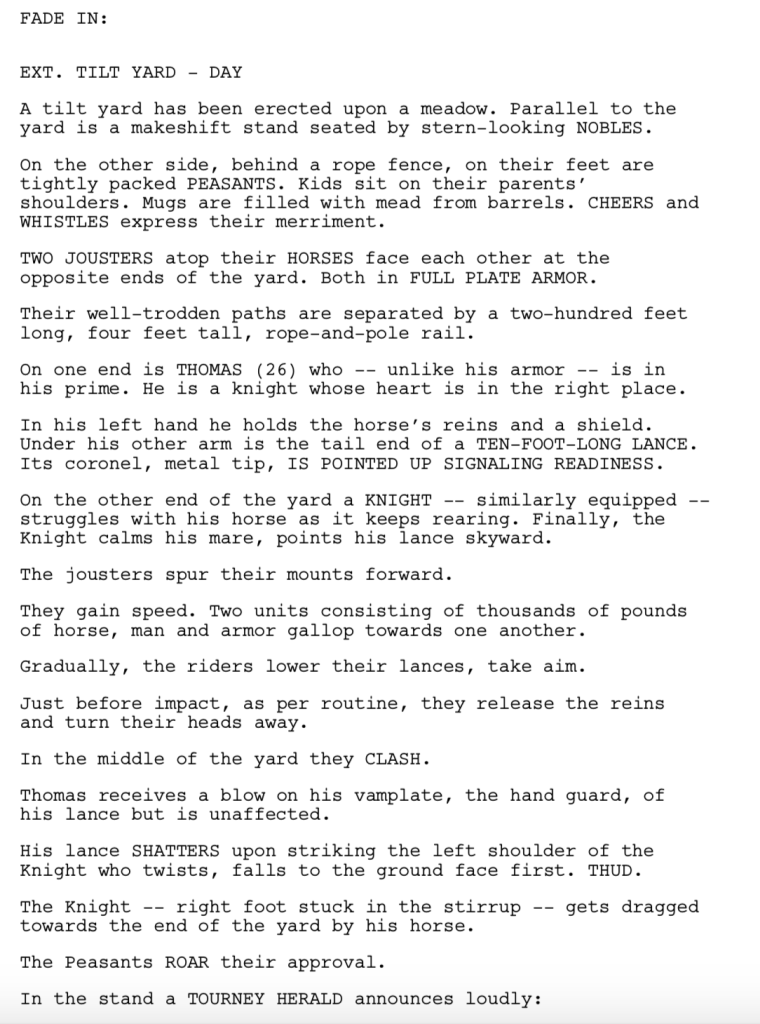Search Results for: amateur
I want you to imagine a scenario with me. You’ve just become the hot cool screenwriting thang on the block. Your nifty biopic about the woman who invented the trampoline finished with 27 votes on the Black List. All of a sudden everyone wants to meet with you. So you go to meeting after meeting and it’s all smiles and high-fives and then, at your final lunch with an executive at at Paramount Pictures, you learn that Michael Bay liked your script so much, he wants you to write the new Transformers spin-off! He feels like your inherent understanding of life’s complexities are going to work great for an Optimus Prime origin story.
So you go off and you write what you feel is a really good Transformers movie about how working in the trucking industry for 20 years helped him become the great autobot leader he is today. You’re not patting yourself on the back or anything. But if they film this script as is? It will be the best Transformers movie by far. There’s more depth and nuance in the final 10 minutes than there have been in all the Transformers movies combined. You’ve heard nightmare stories about getting bad notes from clueless executives, so you’re ready. This is your big shot and you’re going to look at everything through a positive lens.
Well, the primary executive you’re working with on the project, Colin, tells you that he really likes your script, but he’s been mulling it over and wants to go in a different, more exciting, direction. He wants Optimus Prime to be a dinobot. You see, Jurassic World 3 just came out and did bonkers box office and it would be a lot easier to sell this movie with a dinosaur as the protagonist. Uhhh… but this means erasing the truck delivery storyline, which is a key part of Optimus’s transformation. You’d basically have to scrap the whole script and start over. Don’t worry, Colin tells you. You’re a good writer. You’ll figure it out.
So you go and you write a new script, this one starting in the dinosaur age, where Optimus, now a dinobot, has to hide out from the Decepticons. You add a great climactic set piece where Optimus barely escapes death by meteor. You send this new draft in and Michael Bay wants to meet with you. He’s been busy filming a movie so this is the first draft he’s read. “Why is Optimus a dinosaur?” he asks. This movie is about a truck. It’s about truck-driving. You try and explain what happened but all Michael can say is, “Let’s go back to the truck story. Except I had a new idea. We’re going to set this in the future. Way in the future. We’ve seen present-day Transformers too many times. We’re going to give them something different this time around…”
One of the complaints that always bugs me about writers is when they moan and groan about the different writing standards for amateurs and pros. They see a hackneyed sloppily written stinker like Hobbs and Shaw, a movie that’s being played in over 4000 theaters in America alone, and they say, “This script is terrible. Nothing makes sense. Yet my script is dismissed because I had a spelling mistake on page 2.”
Let me say this. I understand every aspiring screenwriter’s frustration. I don’t know if there’s a more inherently demoralizing pursuit than writing. You spend six months writing a screenplay or two years writing a novel, and after you finally finish, a bunch of people tell you, “Meh. It was okay, I guess.” You’ve got to be quite the masochist to put yourself through that experience time and time again. So from the bottom of my heart, I understand your pain.
But now let’s remove feelings from the equation, since nobody in Hollywood cares about your feelings. And let’s look at this objectively. When screenwriters are called upon to write a movie for a studio or a production company, they are no longer the author. The person who’s bankrolling the movie is the author (or whoever the bankroller anoints as the project head). Therefore, you’re not so much writing as you are solving problems. People are coming to you, just like my Transformers example, and they’re telling you to change what you believe are good ideas into bad ones. They’re telling you that an actor wants their character to have more jokes even though that character isn’t a joker. They’re telling you they can’t afford to shoot at Times Square, so you’ll have to move the scene to a forest, even though that fundamentally changes everything about the movie. And these are just normal problems. Wait until you run into a director who decides to rewrite the script you just spent four years on two weeks prior to production.
When that movie then comes out and it doesn’t make sense at all… you blame that all on the screenwriter? The screenwriter is usually the person with the least amount of say on a project. All they can do is pick their battles and try to keep some semblance of a good story together.
Now some of you might say, “Well The Departed was a great script,” or “Schindler’s List rocked.” “So obviously IT IS possible for good movies to be made.” Well yeah. Of course. There are people in Hollywood in powerful positions that understand story. And when those people are shepherding a project, they’re going to be successful more often than not. But, unfortunately, most projects have people working on them who don’t know storytelling well. They may know marketing well. They may know character well. But they don’t know how to put together an A to Z story so they force a lot of bad ideas that you have to incorporate into your script. Does that make you a bad writer? No. Of course not.
Maybe the most high-profile example of this is Indiana Jones and the Kingdom of the Crystal Skull. It is one of the worst screenplays you’ve ever seen make it to the big screen. Long time A-list screenwriter David Koepp wrote that screenplay. Now do you think that David Koepp had any input on that screenplay whatsoever? David Koepp was a glorified exposition typist. They gave him a bunch of set pieces and story beats that didn’t fit together then asked him to make it make sense. This is why it’s so confusing for outsiders to process this. They see David Koepp’s name on this awful movie and they think, “Why would they keep hiring him? That film was trash.” Yeah but everyone knows Koepp had little to no say on how that screenplay went.
Now let’s turn to you, the amateur screenwriter. Your audience is completely different than the professional screenwriter. Let’s start there. The professional is more or less transcribing what someone else wants. That someone is the only audience they have to please. You, on the other hand, are writing to a very specific audience – and I want you to internalize this because it’s probably the most important point I’ll make all post – your audience is people tasked with reading terrible scripts over and over and over again. They have read so many bad screenplays, that by the time they read your script? They are both exhausted and assuming it will be just as bad as everything else they’ve read. Not because they’re trying to keep you down. Because that’s been the reality of their job. So, obviously, you’re going to need to come up with something pretty great to win them over.
There’s a second challenge to this. And I can speak about this from experience. Nobody is interested in you passing them a script that’s pretty good. In every instance where I’ve passed something up to someone – an agent or a producer – that I thought was pretty good, I was basically told to stop wasting their time. The only time anyone wants you to pass something to them is if it’s awesome. And even then, they usually read it and say “no thanks.” The reason why this is important to understand is that a lot of times, a reader will read something that’s genuinely decent. It’s got problems but they weren’t bored while reading the script. Unfortunately, these readers know that even though they thought the script was good, their boss or whoever had them read it, won’t care. They’re only going to care if you’re over-the-moon about the script.
This is a big reason the standards between amateurs and pros are different. You’re writing under a completely different set of circumstances than the pro writer. Now of course, there are other scenarios besides the “studio assignment.” A writer who just had a big sale comes out with another spec and it’s not very good. Well, a producer only cares about getting movies made. And if they have a spec from one of the hottest writers in town, that’s worth something, even if the script isn’t very good. “Us” wasn’t a very good screenplay. It was kind of all over the place. But is there any studio in town who wouldn’t have made Jordan Peele’s second movie? Of course not. So you have to factor that in.
How do you write one of these scripts that blows people away? Or wins a screenplay contest? There is no magical formula. But I can tell you this. Make sure you’ve got a professional presentation. Don’t let the reason you lose a reader be laziness. All of the “basics” need to be on lockdown. From there, it’s about picking a great concept – you can improve your chances of this by sending your ideas to friends and asking them to honestly rank your idea from 1-10. And then executing the story in a way that continually keeps the narrative exciting. We should always WANT to turn the page. We should never feel like we HAVE to turn the page. The more you study screenwriting, the more scripts you write, and the more scripts you read, the better you’ll get at that last part. And to all of you I say, I hope you eventually write the greatest script ever. Because it’s so much easier to read a good script than a bad one.
Yo, do you have a logline that isn’t working? Are those queries going out unanswered? Try out my logline service. It’s 25 bucks for a 1-10 rating, 150 word analysis, and a logline rewrite. I also have a deluxe service for 40 dollars that allows for unlimited e-mails back and forth where we tweak the logline until you’re satisfied. I consult on everything screenwriting related (first page, first ten pages, first act, outlines, and of course, full scripts). So if you’re interested in getting some quality feedback, e-mail me at carsonreeves1@gmail.com with the subject line: “CONSULTATION” and I’ll get back to you right away!
It’s going to be Monday Madness when I review Hobbs & Shaw and determine the question that’s been eating at us for over a decade. Is it possible to make a good Fast and Furious movie without Vin Diesel? They’ve tried before and the results were disappointing. Could the rumor be true? That Dominic saying “family” once every five minutes is the only way these movies work? I’m eager to find out. I’m also eager to see what happens when you make a Fast and Furious movie a sci-fi flick, since apparently that’s where the franchise is headed.
Good news this week as participation does not require any dancing.
If you haven’t played Amateur Showdown before, it’s a cut throat single weekend screenplay tournament where the scripts have been vetted from a pile of hundreds to be featured here, for your entertainment. It’s up to you to read as much of each script as you can, then vote for your favorite in the comments section. Whoever receives the most votes by Sunday 11:59pm Pacific Time gets a review next Friday. If you’d like to submit your own script to compete in a future Amateur Showdown, send a PDF of your script to carsonreeves3@gmail.com with the title, genre, logline, and why you think your script should get a shot.
Note: Accessing scripts should be a lot easier this week as I’m using Google Drive. :)
To all who have entered this weekend’s contest, I wish you…. GOOD LUCK!
Title: Cop Cam
Genre: Found footage/Crime-thriller
Logline: Told through the lens of a police-worn body camera, a retiring cop with a baby on the way faces the most harrowing shift of his career after a traffic stop devolves into a violent mess affecting both sides of the law.
Why You Should Read: I’ve always thought a found-footage film involving a cop’s body camera would be an interesting concept to explore. Police-worn body camera footage persists as some of the most controversial, yet fascinating forms of real-time-media in existence today. Think about it, when’s the last time you didn’t click on a “contains graphic content” police video that was shared to social media? The footage always tells a story, but rarely captures the facts in their entirety. As a police lieutenant, I watch countless hours of body cam footage from the officers under my watch and am rarely ever bored. On the contrary, they typically inspire movie ideas for my scripts. For “Cop Cam”, I wanted to infuse elements from some of the most disturbing videos I’ve encountered into a grounded, found-footage crime-thriller told from the first-person perspective of one cop’s final day on duty. While most found footage films deal in supernatural horror, I aimed to bend the genre here into purely thriller territory, although a lot of feedback has mentioned it certainly flirts with horror. The script just received positive coverage from WeScreenplay: “This high-octane, action-packed thrill ride is a rip-roaring page-turner told with unflinching authenticity. The amount of story, twists, and turns in this tight script is a strong showing of narrative economy. A cops and robbers caper that unfolds like a beautiful car wreck with a continually worsening state of affairs that’s likely to appeal to mass audiences. This is one flat out cool movie.”
Title: Coven
Genre: Psychological Horror
Logline: When a homeless teenage girl becomes the newest member of an acid-popping doomsday cult known as The Coven, a long-dispirited member makes it her mission to escape with the young girl before she falls under the spell of The Professor, their abusive yet charismatic leader.
Why You Should Read: Like many screenwriting hopefuls, I submitted some scripts to the Nicholls this year, hoping that one of them may be the script that changes everything. Unfortunately, this year was not my year. Nevertheless, “Coven” finished in the top 10% – a personal best and a sign that my work is improving year after year. While I impatiently wait for the reader comments, I figured it would be awesome to get some feedback from the community that arguably taught me the most about the art of screenwriting.
“Coven” is my stab at one of my favorite horror sub-genres: the cult film. It’s a weird, violent, psychedelic, slow-burn story with a heavy emotional core, featuring a strong female lead who works to escape the trauma of her past and the physical (and psychological) prison she’s found herself in. And to sweeten the pot, about 90% of the film takes place in one location, so it can made on a shoe-string budget (I’m looking at you, Blumhouse!).
Many thanks to anyone who gives this a read; whether it’s the whole thing or just a few pages, any and all feedback is greatly appreciated! And a special thanks to Carson for holding a forum where a nobody like me can get their work in front of so many smart and talented people. Looking forward to hearing what you guys and gals have to say!
Title: MYSTERY MAN
Genre: Action Comedy
Logline: America’s favorite mystery author returns home for his father’s funeral and reluctantly teams up with his crazy sister who believes their father was murdered.
Why You Should Read: The inspiration for “Mystery Man” was derived from a love for whodunnits and my wacky home state of Florida. With twists and turns that will keep you guessing to the very end, “Mystery Man” is raunchy at times, heartfelt at others, and always weird. “Mystery Man” was a semifinalist in both the 2017 Stage 32 Annual Comedy Contest and Screencraft’s Annual Comedy Contest. It also placed second in Final Draft’s Annual Big Break Contest (2017) in the comedy category. Subsequently, “Mystery Man” was optioned for a year. The option recently expired so it’s now back on the market!
Title: INK
Genre: Noir
Logline: When screenwriter Don Miller goes missing from the lot of Dionysus Pictures, toon actor Chester Charles is sent to try and discover where he is, but soon finds himself shoulder deep in the greatest conspiracy that Tinseltown has to offer.
Why You Should Read: My last script WONDERLAND was featured here on Scriptshadow and I received some really great feedback from the community. One of the big notes was that people wanted to see me play in my own sandbox rather than build on someone else’s work… So, I created one… A conspiracy thriller set in an alternative 1950’s Hollywood where the moguls that run the place are willing to turn to nefarious means to keep their stars in order (both human and toon), their wallets fat and the ‘Red Menace’ at bay. INK marries the Disney Conspiracies with Who Framed Roger Rabbit and adds a smattering of observations about the manipulative power of the media.
Title: BROKENHEARTED
Genre: anti-rom-com
Logline: In a misguided attempt to mend her broken heart, a lovelorn twentysomething decides to pursue a casual, no-emotions-attached fling with a womanizing stranger from Tinder.
Why You Should Read: Greetings! An older draft of this script won the Austin Film Festival Drama Screenplay Competition in 2017. Prior to the festival win, I secured a manager who found me on Blcklst after Brokenhearted received that magic number 8 (amongst some 7s and 5s.) The script got me general meetings at a few reputable production companies and one big studio (Naming names feels tacky.) I had the opportunity to pitch on an open assignment. (Crashed and burned obviously.) Brokenhearted has always been a divisive script, and with the encouragement of my manager, I did a massive rewrite of the script alongside a credited director. The rewrite involved structural changes, supporting character gender swaps, and massive “killing of darlings,” particularly chatty banter dialogue sequences. The new (and improved?) draft landed just outside the Top 5% (Quarterfinals) of the Nicholl Fellowship. I received the dreaded “some good news: your script just missed advancing, placing among the next 100 scripts after the 365 quarterfinalists” email. Aside from reads from the director, my manager, and a few writer friends, I haven’t really put this script out there for public scrutiny. Nicholl 2019 was the first real litmus test. I’ve written, re-written, read, and re-read this thing so many times that I’m completely emotionally detached. The re-write was a rewarding experience, one I feel produced a stronger draft. But my eyes stayed dry. I can’t help but wonder: has the script lost its soul? I’ll admit to being a bit of a lurker here on ScriptShadow for about the last year. As someone who has been active in the screenwriting community and contest circuit since 2014, I don’t know why it took me so long to join the party. (That’s a lie. It’s because I’m an INFJ.) And that was a long-ass “why you should read.” I promise the screenplay has a ton of white space. Thank you for your consideration!
Genre: Spy/True Story/Thriller
Premise: In 1985, when CIA Officer Aldrich Ames sells what he believes to be useless intelligence to the Soviets to pay for his divorce, he inadvertently sets off an international Cold War crisis that finds him heading up a special CIA unit — a unit created to find out who sold secrets to the Soviets.
Why You Should Read: Being true, it’s a spy story that’s more grounded than most, but also barely believable in how it plays out. There are absurdities that could only come from real life. It’s based on research drawn from the Senate Committee report published after Ames’s arrest, as well as testimony from the Soviet Intelligence Officer who ran Ames as an agent. Personally, I could use some writerly interaction with my work as I’ve been more-or-less blocked for the better part of a year, and need to get back into the flow. I’d be very grateful for any and all response to the script. Thanks.
Writer: Will Alexander
Details: 133 pages
Man, I had one heck of a long day today. I had to do 10,000 things around town. I then had to do a ton of reading. Some analysis. And then, when I was dying for some sleep, I still had to get this post up. I bring this up as a reminder that sometimes – in fact, probably most times – these are the conditions your script is being read under. If you’re not turning in a draft of the latest Marvel movie to Disney, your priority level is, unfortunately, pretty low. All the more reason to grab the reader right away and make them forget about all of that. That’s what writing is. It’s creating a story so compelling that whatever the reader has going on in their life, in their head, all of that disappears because they’re sucked into your world. So let’s see if Will can pull that off. I’m opening the script now…
It’s 1985. Washington D.C. Aldrich “Rick” Ames, is 42 years old and one of the better CIA agents. He’s in the midst of a divorce and fighting with his wife over the settlement. It’s looking more and more like he’s going to have to pay her a lot of money. Meanwhile, he’s fallen in love with a Columbian woman named Rosario. Rosario likes to tally up $1500 monthly phone bills to Columbia.
Ames’ main contact in the Soviet Union – who, by the way, we’re in a nuclear arms race with – is a man named Sergey. It’s not entirely clear to me why he meets with Sergey, but as best I can tell, he makes his superiors believe that Sergey is a good contact who he can convert into a spy. This allows him a lot of face time with Sergey, and, at a certain point, Sergey starts asking for info. A light bulb goes off for Ames. He can demand 50 grand, give Sergey a couple of names, and not have to worry about money anymore. Which he does.
What he doesn’t know is that Sergey has already figured him out. Rosario is a money succubus. This 50 grand won’t do anything. Which means Ames will have to come back for more. And when he comes back for more, Sergey will ask for more names. And that’s exactly what happens. The CIA is baffled when all of their spies start getting caught. They figure there’s a mole but nobody suspects Ames at all for some reason. Ames continues to trade contacts for cash to the tune of 4 million dollars. A decade later, after he’s settled into the high life, they catch him. Ames is said to be responsible for 10 CIA agents’ deaths.
Okay, I’m about to go on a rant here. You’ve been warned.
133 pages?
If there’s a top 5 rules in screenwriting, “Don’t write a script that’s over 120 pages if you’re an amateur screenwriter,” is in it. It might even be number 1 on the list. Because what happens is what happened today. I’m overworked. I’m tired. But I have to read this script. I open it up. And then I see that number. And once I see that number, I’m enraged. My night has just gotten a lot longer.
It’s not just that. It’s that when you have a long script and a reader with not a lot of time, they’re not going to be able to give your script the focus it requires. When they encounter something they don’t understand in your story, they’re not going to go back and reread it. They’re going to keep going. And in a script like this? With unfamiliar Russian names and the need to keep track of agents and double-agents and who’s lying and who’s not. You’re digging your own grave.
So, look. You can be the person who ignores this stuff and does it your own way. It’s not like no one’s ever succeeded by breaking the rules. But I’m just trying to help you guys avoid basic pitfalls that infuriate people in the business. I want you to succeed. So I’m going to keep reminding you about this stuff.
And by the way, this occurs in contests as well. I know some people will say, well this is more of contest script anyway. Okay, tell that to the guy who has to read 4-5 contest scripts a day.
Moving onto the script, here’s what I liked. There’s a sophistication to this script. There’s a love of the genre. There’s a crazy amount of attention to detail. The writer swung for the fences. He wasn’t trying to write Zombie Vampire Date Night From Hell. This is an Oscar aspiring script. On top of that, this is actor and director bait of the highest order. Steven Spielberg signed onto a similar project, Bridge of Spies. So the counter-argument to everything I just said is THAT. This project has tremendous upside.
If it’s well-executed.
Was it well-executed?
Well, I’ll put it like this. This is a great character-study. And Ames is a perfect metaphor for America. We’re often assumed to be a nation of greed. And that’s what we see play out here. So when I look at the movie as a whole, I like that component of it.
However, when I look at its individual parts, it wasn’t an easy read. You’d get a lot of long scenes with men sitting down talking. And in those scenes, the chunks of dialogue would not be 2-3 lines long. They would be 10-15 lines long (not all of the time, but enough to say it happened frequently). This verbosity took its toll on the pacing and overall enjoyment of the script. In fact, I think you could eliminate 10 pages here just by cutting down how much everyone says every time they open their mouth.
Also, the story didn’t evolve enough. I got the same feeling in a scene on page 80 as I had on page 40. The boiling pot of Ames getting closer and closer to being discovered kept the story moving. But there was a lack of differentiation to the scenes. It felt like I read 20 scenes between Ames and Rosario that were exactly the same. And Ames always seemed to be sitting at a table talking to someone. I don’t know. I wanted more variety in what I was seeing.
One of the skills that’s important for a screenwriter to remember is the skill of condensing. Anybody can write some rambling 160 page story. But one of the reasons they need screenwriters is because non-screenwriters don’t know how to condense story. They don’t know what parts can be thrown out, what parts can be combined, what characters can be jettisoned. This is what great screenwriters are masters at. If a director comes to them and says, “Look, I don’t have the money to shoot all three of these scenes. Can you write a scene that combines all of them?” they can do it in a heartbeat!
And I get that there’s no rules. But, at the same time, you can’t be too precious. You have to think of the reader and the pacing and make tough choices so that the script is not just an accurate telling of your story, but an entertaining telling of it.
This is a strong topic. I can totally see a studio wanting to tell this guy’s story. In fact, I can imagine the trades write up of it and I wouldn’t blink an eye if I saw it. But for me it was too big, too repetitive at times, and probably needed a couple of “HOLY SH*T” scenes in the middle that were unforgettable. I wish Will all the luck in the world because he’s an awesome contributor to the site. However, next time, I want that easy read from him! :)
Script link: Year of the Spy
[ ] What the hell did I just read?
[x] wasn’t for me
[ ] worth the read
[ ] impressive
[ ] genius
What I learned: I wouldn’t intricately weave well-known music into a montage. By that I mean, you give us a few montage images, then a lyric from the song, then more montage images, then another lyric. Here’s why. While this stuff works GREAT on screen, it’s actually really hard to follow on the page. Often times, we don’t know the song as well as you do. So when you give us a lyric, we have to stop, sing the song in our head, get to that lyric to know what we’re listening to, and then get back to the montage, which is already a disjointed experience, considering we’re jumping to different moments in time. And, on top of that, they never get the song you want anyway. They always have to pay for something cheaper. So I would leave that part up to the filmmakers and just make your script as easy to read as possible.
Just a friendly reminder to anyone submitting a script for Amateur Friday. I recognize that this is a nice opportunity to get feedback for scripts that are works in progress. But I’m letting you know now that any pitch along the lines of, “I’m not really sure about this script. I’m hoping to see what people think” isn’t going to get chosen. This is the only place on the internet where random strangers willingly read amateur screenplays. So I’d prefer to put the best stuff up here I can find. There’s no hard and fast rule to this. If you send one of these e-mails and include a Jurassic Park level logline, then yeah, I might post it. But, generally speaking, I won’t. The scripts that win Amateur Showdown tend to be scripts that the writers have put a ton of work into. So you’re gonna want to bring your best anyway.
Oh, and I have one minor requirement for readers participating in this weekend’s festivities. Before reading any of the scripts, you must first perform The Git Up Challenge. Preferably with the shades up so that your neighbors can see you.
If you haven’t played Amateur Showdown before, it’s a cut throat single weekend screenplay tournament where the scripts have been vetted from a pile of hundreds to be featured here, for your entertainment. It’s up to you to read as much of each script as you can, then vote for your favorite in the comments section. Whoever receives the most votes by Sunday 11:59pm Pacific Time gets a review next Friday. If you’d like to submit your own script to compete in a future Amateur Showdown, send a PDF of your script to carsonreeves3@gmail.com with the title, genre, logline, and why you think your script should get a shot.
Title: The Above
Genre: Contained Thriller
Logline: Awaking on an unknown flight to find everyone else unconscious, a dazed baggage-handler must uncover his foggy past and save the plane before it falls from the sky.
Why You Should Read: Contained thrillers still today seem to remain one of the best ways to sell a spec. One possible issue with them is that they sometimes can feel like they’re stuck in place (which they usually are). Here’s my try at avoiding that issue by using a contained location that’s moving at the speed of hundreds of miles per hour. I went back to see Carson’s reviews on earlier contained material and tried my best to incorporate all the best parts of them, from clear GSU to steadily unfolding mystery. Very interested to hear everyone’s thoughts!
Title: The Final Solution(s)
Genre: Historical Fiction/Science Fiction
Logline: A centenarian recounts to his great grandson how he was secretly recruited as a WWII soldier to be transported to biblical times to counter Hitler’s plot to destroy a fledgling Jewish nation.
Why You Should Read: My day job is as real as it gets; I’m an urban public defender. I employ the persuasive power of words to desperate situations, often for societies’ outcasts. And while I feel generally fulfilled by my calling to serve the voiceless, the law is not my first love. Books and movies occupy that place. Fiction and philosophy are my particular favorites, but I partake in all levels of discourse, from Cable News to Cardi B, Stephen Hawking to Steven Soderbergh, James Fenimore Cooper to Jim Rockford. Currently, I am trying to discover how a late-forties father of two with a second marriage and two more step kids, nagging yoga injuries, an inflated mortgage, a stressful career and all the other normal trappings of middle-class American life can become a Dharma Bum. I doubt I’m the only one seeking that answer, but perhaps I’m the only one framing the question quite like that.
Everything I write at this point in my life strives to highlight the primordial human yearning for peace and love set against the grit and contradictions of our post-everything world. The attached screenplay reflects my personal appreciation for art and science as well as history and fiction. Hopefully it reflects my deepest belief about all art, namely, that art should seek simultaneously to entertain and to educate, to touch both intellectually and emotionally, and, most of all, should serve to nurture each of us to find our best, our most complete selves. If nothing else, this script represents the uniqueness of me, my life experiences and worldview, and in that way will be unlike anything else you have ever read. I can think of no other work in literature or the movies that weaves history, fiction and the bible together in such a cohesive and plausible manner. And yet, in the end, it is the relationship of storyteller to listener, ancient mariner to wedding guest, that forms the emotional center of the work and delivers the simple moral truth that drives this story forward.
Title: YEAR OF THE SPY
Genre: Spy, True Story, Thriller
Logline: In 1985, when CIA Officer Aldrich Ames sells what he believes to be useless intelligence to the Soviets to pay for his divorce, he inadvertently sets off an international Cold War crisis that finds him heading up a special CIA unit — a unit created to find out who sold secrets to the Soviets.
Why you might read: Being true, it’s a spy story that’s more grounded than most, but also barely believable in how it plays out. There are absurdities that could only come from real life. It’s based on research drawn from the Senate Committee report published after Ames’s arrest, as well as testimony from the Soviet Intelligence Officer who ran Ames as an agent. Personally, I could use some writerly interaction with my work as I’ve been more-or-less blocked for the better part of a year, and need to get back into the flow. I’d be very grateful for any and all response to the script. Thanks.
Title: The Crooked Tree
Genre: Horror
Logline: While staying on a rural plantation, a live-in hospice nurse, struggling with the loss of her daughter, must save her young patient from a mysterious intruder.
Why You Should Read: Before becoming a full-time Registered Nurse, I attended film school with a foray in horror screenwriting; my ultimate passion. I’ve always loved the genre and the craft, but, at the time, I felt that I could make a better living as a RN. But that writing itch never left! Over a decade since I wrote my last screenplay, comes The Crooked Tree, a unique combination of home invasion and occult horror. This is a love letter to my two favorite sub-genres and I hope you are willing to give it a chance! To quote recent WeScreenplay coverage, “The Crooked Tree offers a very fresh and horrifying vision that feels unique. A terrifying addition to the genre.”
Title: OFF-GRID
Genre: Thriller.
Pitch: Searching meets Nightcrawler.
Logline: An overprotective ex-cop discovers his daughter’s hidden life as an exam cheat sheet organizer after she goes missing from school.
Why You Should Read: Hey Carson, my name is Sylvester Ada. 2 years ago, you reviewed my pilot script CLUB LAVENDER about the cabaret drag queen caught up in a mob war. It received a worth the read from you and while you loved the writing, calling it one of the best written scripts of the year, you weren’t a fan of some story elements. Here’s my first completed feature. It’s a lean 81 pages with lots of white space, action and just an all round fun read. The perfect candidate for the age of streaming content and most likely going to be one of the most fun scripts you’ve read all year. It also deals with real world tech and grounds it in a fun way.
I received an all-timer screenplay e-mail query. I can’t give you the whole thing but here’s the heart of it: “I have ten scripts, but I’m sending 10 query letters (summary) with my bio (last page of Query-10 script) first and then you can decide which one someone you’ll refer to make a movie out of one or more of my scripts. I hope you don’t think it’s too long or too much to read. I put full query letter if you want to read straight through and individual query letter just in case you give my query letter to more than one person. I have scripts on copyrights and WGA just in case of theft.” Ten scripts were attached. Dear lord. Do some research before you send out a query like this!
If you haven’t played Amateur Showdown before, it’s a cut throat single weekend screenplay tournament where the scripts have been vetted from a pile of hundreds to be featured here, for your entertainment. It’s up to you to read as much of each script as you can, then vote for your favorite in the comments section. Whoever receives the most votes by Sunday 11:59pm Pacific Time gets a review next Friday. If you’d like to submit your own script to compete in a future Amateur Showdown, send a PDF of your script to carsonreeves3@gmail.com with the title, genre, logline, and why you think your script should get a shot.
By the way, if you don’t like the concepts (and there are some issues with concepts this week) don’t say stuff like, “These concepts blow! What were the writers thinking??” Instead, help them. Constructively explain why the concepts don’t work for you. To the writers this week: Concept is one of the more subjective components of screenwriting. So if you get one or two “weak concept” comments, don’t toss the script. But if you’re getting more than that, you might want to listen to the complaints.
Good luck!
Title: Dreading The Wedding
Genre: Comedy
Logline: With the help of a charismatic but crazy mentor, a groom-to-be attempts to overcome his fear of public speaking before his dreaded wedding day speech.
Why You Should Read: Public speaking amazingly ranks as the number one fear in society. Even ahead of such terrifying things as death, spiders and getting a bad review on Scriptshadow. Many men with this fear can go their whole life avoiding giving any kind of a speech. Until their wedding day. Then they are given a microphone and expected to entertain a room full of drunken guests. Good luck. There have been many wedding comedies that have tackled the other issues of the big day, like finding a best man, finding a date, even losing the groom and finding him again. But none about overcoming the most common fear in society. If that’s not enough then I at least think the title is pretty catchy and can become the motto for anyone attending weddings against their will this summer.
Title: Carve
Genre: Horror, Home invasion
Logline: A diehard vegetarian must survive the Thanksgiving dinner from hell when murderous animal rights activists invade the home of her boyfriend’s family.
Why You Should Read: I wrote CARVE last Thanksgiving over the course of three days (don’t worry, I spent a lot of time getting feedback and editing after that). Despite the relatively quick first draft, I’m more pleased with the script than many of my projects that have taken twice the time.
With CARVE, I applied an animal-rights angle and a dark sense of humor to a budget-friendly Thanksgiving home invasion story. It’s a nasty, lean 89 page read, inspired by the likes of GREEN ROOM, YOU’RE NEXT, and THE INVITATION.
Based on positive responses from peers and Black List (“CARVE is a highly original and horrifying script with many disturbing twists and turns”), I hope you all will enjoy the read and have some advice for the next draft.
ENTRY REMOVED – WRITER REPPED AND NOW SHOPPING SCREENPLAY – :)
Title: Goodnight Kill
Genre: Dark Comedy
Logline: A standup comedian and a Russian assassin trade services for a night.
Why You Should Read: I have written for The Eric Andre Show, @midnight and a number of commercials. This script received a Recommend from the coverage people at Bloodlist.com.
Title: ONCE UPON A HEIST
Genre: Fantasy / Action
Logline: A down-on-his-luck knight is recruited by a group of thieves to steal the king’s most treasured possession — the goose that lays the golden eggs.
Why You Should Read: I wanted to find a fresh angle into an old genre. What resulted is a heist story set inside a fairy tale world. In its center is a good-hearted protagonist who struggles between doing noble deeds and necessary evils. The narrative has an ironic premise alongside a strong objective. It’s filled with conflict, action and thrills and it touches on topics that are relatable in our modern times. On top of all that it has commercial appeal. I hope the ScriptShadow community can offer its invaluable input to further my quest to make this script the best it can be.

